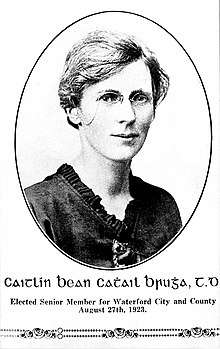Caitlín Brugha
Caitlín Brugha (née Kingston; 11 December 1879 – 1 December 1959) was an Irish Sinn Féin politician who served as a Teachta Dála (TD) for the Waterford constituency from 1923 to 1927.
Caitlín Brugha | |
|---|---|
 | |
| Teachta Dála | |
| In office August 1923 – June 1927 | |
| Constituency | Waterford |
| Personal details | |
| Born | Kathleen Kingston 11 December 1879 Birr, County Offaly, Ireland |
| Died | 1 December 1959 (aged 79) Dublin, Ireland |
| Nationality | Irish |
| Political party | Sinn Féin |
| Spouse(s) | Cathal Brugha (m. 1912; d. 1922) |
| Children | 6, including Ruairí |
Early life
Kingston was born in Birr, County Offaly to William Kingston a shopkeeper, and Catherine (née Roche). Brugha attended the Convent of the Sacred Heart in Roscrea. Her family later moved to Dublin when she was 31 and Brugha continued the activism she had been part of through the Gaelic League when she got there. Brugha married Irish revolutionary Cathal Brugha, head of a candle manufacture company, in 1912. Because of the family activities and involvement in the War of Independence, they moved several times, to the Ring Gaeltacht in Waterford and Ballybunion in Kerry. In the aftermath of the Truce the family was able to return to Dublin.[1]
Elections
Cathal Brugha died in battle on 7 July 1922 in the first days of the Irish Civil War, having taken the Republican side opposing the Anglo-Irish Treaty. His death left her widowed with six children under the age of 10. She ran for what had been her husband's seat and was elected to Dáil Éireann as a Sinn Féin TD at the 1923 general election for the Waterford constituency.[2]
She was re-elected at the June 1927 general election. In accordance with Sinn Féin policy of the time she did not take her seat in Dáil Éireann. She stayed with the abstentionists of Sinn Féin when Éamon de Valera left to found Fianna Fáil. Sinn Féin was unable to raise the funds to contest the second election called that year,[3] and Brugha did not contest the September 1927 general election.[4] Brugha successfully campaigned on the welfare of Republican prisoners.[1]
Later life
She established a drapery business, Kingston's Ltd, in 1924 and following her exit from politics devoted much time to the venture. Her continuing anti-Britishness was evidenced when in 1941, when she was accused of harbouring a German spy who had parachuted into Wexford.[5]
Her son Ruairí Brugha became a Fianna Fáil politician and was elected to Dáil Éireann at the 1973 general election.
See also
References
- "Remembering Caitlín Brugha, TD for Waterford, 1923-1927". Reflections on history, feminism, activism and politics. 4 December 2018.
- "Caitlín Brugha". Oireachtas Members Database. Retrieved 27 April 2009.
- 'Mr. Cosgrave And The Oath', The Times, 30 August 1927
- "Caitlín Brugha". ElectionsIreland.org. Retrieved 27 April 2009.
- S. Pašeta, ‘Brugha, Caitlin (1879–1959)’, Oxford Dictionary of National Biography, Oxford University Press, October 2005